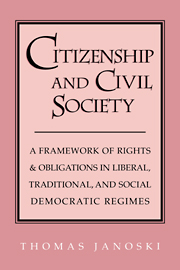 Citizenship and Civil Society
Citizenship and Civil Society Book contents
- Frontmatter
- Contents
- List of Figures and Tables
- Acknowledgments
- 1 Introduction to Citizenship
- 2 The Framing of Citizenship Rights: Expansion, Clarification, and Meaning
- 3 Reconstructing Obligations and Patriotism: Limitations, Sanctions, and Exchange in a System of Rights
- 4 Citizen-Selves in Restricted and Generalized Exchange
- 5 The Balance of Rights and Obligations through Nesting, Civil Society, and Social Closure
- 6 Incremental Change in Citizenship over Decades: Power Resources, State Structures, Ideology, and External Forces
- 7 Momentous Change in Citizenship over Centuries: From Wasps to Locomotives in the Development and Sequencing of Rights
- 8 Conclusion and Implications
- Notes
- References
- Subject Index
- Name Index
4 - Citizen-Selves in Restricted and Generalized Exchange
Published online by Cambridge University Press: 05 June 2012
- Frontmatter
- Contents
- List of Figures and Tables
- Acknowledgments
- 1 Introduction to Citizenship
- 2 The Framing of Citizenship Rights: Expansion, Clarification, and Meaning
- 3 Reconstructing Obligations and Patriotism: Limitations, Sanctions, and Exchange in a System of Rights
- 4 Citizen-Selves in Restricted and Generalized Exchange
- 5 The Balance of Rights and Obligations through Nesting, Civil Society, and Social Closure
- 6 Incremental Change in Citizenship over Decades: Power Resources, State Structures, Ideology, and External Forces
- 7 Momentous Change in Citizenship over Centuries: From Wasps to Locomotives in the Development and Sequencing of Rights
- 8 Conclusion and Implications
- Notes
- References
- Subject Index
- Name Index
Summary
What citizens do politically is not just a matter of their social and economic circumstance, it is also a matter of the particular outlooks they have about politics and the specific values they may seek to express.
Geraint Parry, George Moyer, and Neil Day (1992, p. 172)A continuing source of resistance to the use of exchange models in sociological theory is that they seem to reduce all forms of social relationship to market models of contract, when clearly the specific and calculated character of market exchanges marks them out as rather distinctive.
At the same time exchange in a more general sense is a very useful tool in social analysis: in any relationship (from love to hate) something is given and something is taken. We can make progress by defining the field of exchange generally and by then locating different types of exchanges more precisely within that field.
Colin Crouch (1990, p. 69)Having discussed rights and obligations, it is clear that they are related to each other in some way. Often these and other social relationships are seen in terms of pure self-interest and individualism (e.g., rational choice and social exchange theories). At other times, rights and especially obligations may be cast in terms of altruism and caring (e.g., normative, communitarian, and many feminist theories). The use of multifaceted exchange models combined with Weber's theory of social action can help us move away from viewing these relationships as being one or the other (i.e., constant and dichotomous) and conceptualize rights and obligations in terms of a more complex relationship (i.e., variable and continuous).
- Type
- Chapter
- Information
- Citizenship and Civil SocietyA Framework of Rights and Obligations in Liberal, Traditional, and Social Democratic Regimes, pp. 75 - 103Publisher: Cambridge University PressPrint publication year: 1998


